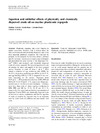Identificador persistente para citar o vincular este elemento:
https://accedacris.ulpgc.es/jspui/handle/10553/75424
| Campo DC | Valor | idioma |
|---|---|---|
| dc.contributor.author | Almeda, Rodrigo | en_US |
| dc.contributor.author | Baca, S | en_US |
| dc.contributor.author | Hyatt, C | en_US |
| dc.contributor.author | Buskey, E. | en_US |
| dc.date.accessioned | 2020-11-11T15:04:23Z | - |
| dc.date.available | 2020-11-11T15:04:23Z | - |
| dc.date.issued | 2014 | en_US |
| dc.identifier.issn | 0963-9292 | en_US |
| dc.identifier.uri | https://accedacris.ulpgc.es/handle/10553/75424 | - |
| dc.description.abstract | Planktonic copepods play a key function in marine ecosystems, however, little is known about the effects of dispersants and chemically dispersed crude oil on these important planktonic organisms. We examined the potential for the copepods Acartia tonsa, Temora turbinata and Parvocalanus crassirostris to ingest crude oil droplets and determined the acute toxicity of the dispersant Corexit 9500A, and physically and chemically dispersed crude oil to these copepods. We detected ingestion of crude oil droplets by adults and nauplii of the three copepod species. Exposure to crude oil alone (1 lL L-1 , 48 h) caused a reduction of egg production rates (EPRs) by 26–39 %, fecal pellet production rates (PPRs) by 11–27 %, and egg hatching (EH) by 1–38 % compared to the controls, depending on the species. Dispersant alone (0.05 lL L-1 , 48 h) produced a reduction in EPR, PPR and EH by 20–35, 12–23 and 2–11 %, respectively. Dispersanttreated crude oil was the most toxic treatment, *1.6 times more toxic than crude oil alone, causing a reduction in EPR, PPR and EH by 45–54, 28–41 and 11–31 %, respectively. Our results indicate that low concentrations of dispersant Corexit 9500A and chemically dispersed crude oil are toxic to marine zooplankton, and that the ingestion of crude oil droplets by copepods may be an important route by which crude oil pollution can enter marine food webs. | en_US |
| dc.language | eng | en_US |
| dc.relation.ispartof | Ecotoxicology | en_US |
| dc.source | Ecotoxicology [ISSN 0963-9292], v. 23, p. 988–1003 | en_US |
| dc.subject.other | Crude oil | en_US |
| dc.subject.other | Dispersant Corexit 9500A | en_US |
| dc.subject.other | Planktonic copepods | en_US |
| dc.subject.other | Sublethal toxic effects | en_US |
| dc.subject.other | DWH crude oil spill | en_US |
| dc.subject.other | Environmental pollution | en_US |
| dc.title | Ingestion and sublethal effects of physically and chemically dispersed crude oil onmarine planktonic copepods. | en_US |
| dc.identifier.doi | 10.1007/s10646-014-1242-6 | en_US |
| dc.description.lastpage | 1003 | en_US |
| dc.description.firstpage | 988 | en_US |
| dc.relation.volume | 23 | en_US |
| dc.investigacion | Ciencias | en_US |
| dc.type2 | Artículo | en_US |
| dc.description.numberofpages | 16 | en_US |
| dc.utils.revision | Sí | en_US |
| dc.identifier.ulpgc | No | en_US |
| dc.contributor.buulpgc | BU-BAS | en_US |
| dc.description.sjr | 1,249 | |
| dc.description.jcr | 2,706 | |
| dc.description.sjrq | Q1 | |
| dc.description.jcrq | Q2 | |
| dc.description.scie | SCIE | |
| item.fulltext | Con texto completo | - |
| item.grantfulltext | open | - |
| crisitem.author.dept | GIR ECOAQUA: Ecofisiología de Organismos Marinos | - |
| crisitem.author.dept | IU de Investigación en Acuicultura Sostenible y Ecosistemas Marinos (IU-Ecoaqua) | - |
| crisitem.author.dept | Departamento de Biología | - |
| crisitem.author.orcid | 0000-0002-0090-112X | - |
| crisitem.author.parentorg | IU de Investigación en Acuicultura Sostenible y Ecosistemas Marinos (IU-Ecoaqua) | - |
| crisitem.author.fullName | Almeda García, Rodrigo | - |
| Colección: | Artículos | |
Citas de WEB OF SCIENCETM
Citations
82
actualizado el 08-feb-2026
Visitas
77
actualizado el 10-ene-2026
Descargas
84
actualizado el 10-ene-2026
Google ScholarTM
Verifica
Altmetric
Comparte
Exporta metadatos
Los elementos en ULPGC accedaCRIS están protegidos por derechos de autor con todos los derechos reservados, a menos que se indique lo contrario.
